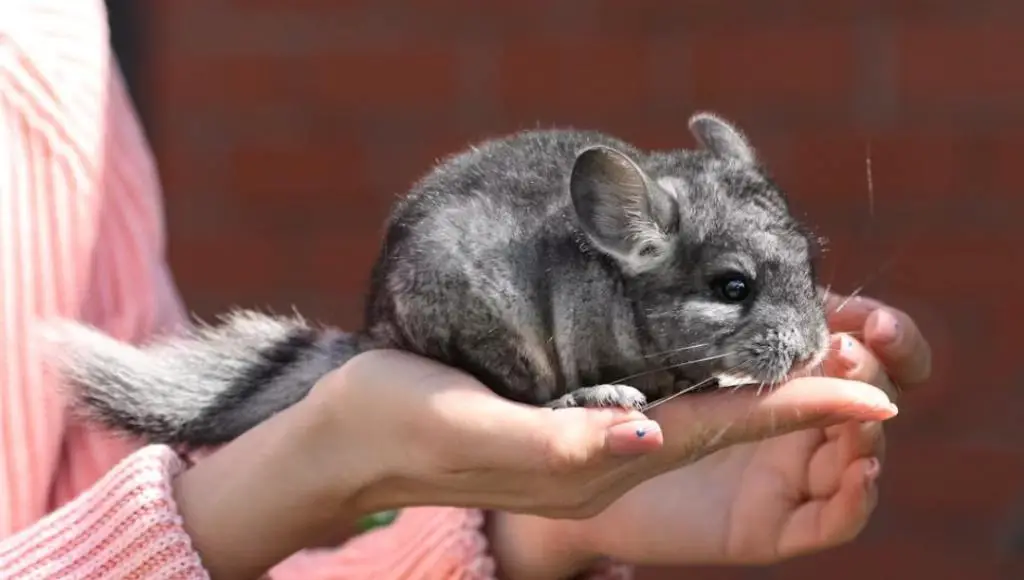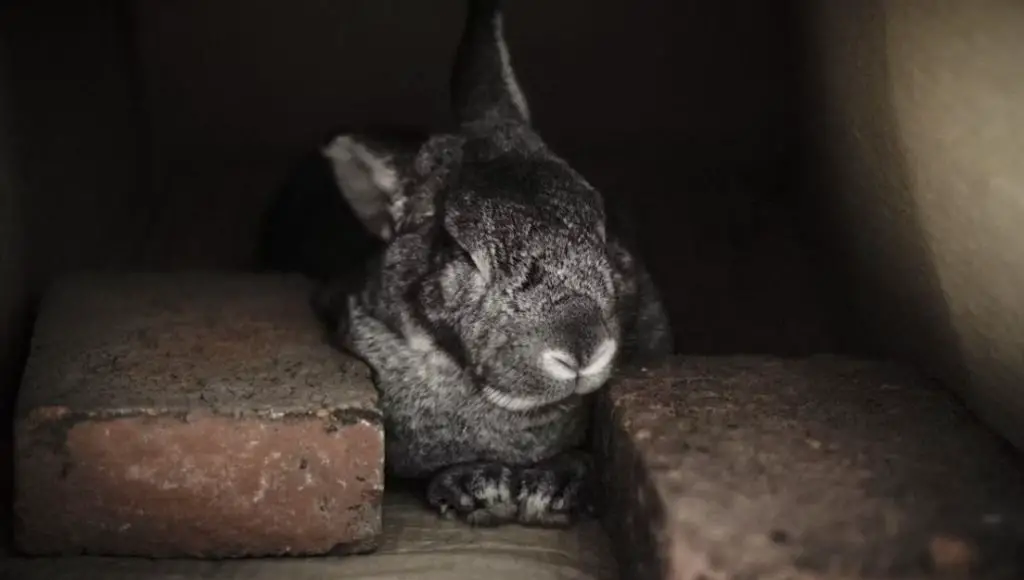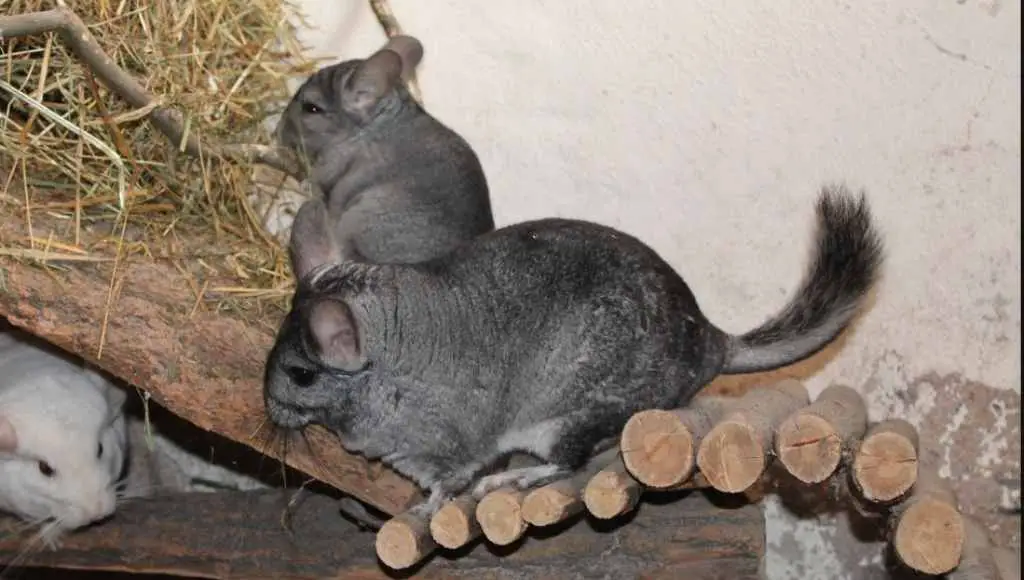11 Common Signs Your Chinchilla Doesn’t Like You

Are you curious about how your chinchilla feels about you? We’ve got you covered.
In this article, we’ll explore the subtle signs that might indicate your furry friend isn’t quite head over heels for you.
So, let’s dive in and decode the secret language of chinchillas!
Signs Your Chinchilla Doesn’t Like You
Chinchillas may not like you if they hide, shy away, or avoid interacting with you, they might also exhibit aggressive behavior such as biting, lunging, or spraying urine when feeling scared or territorial.
Additionally, signs of stress or fear, such as making noises, hiding, or chewing fur, can indicate that your chinchilla is not comfortable or happy.
It’s important to understand and respect your chinchilla’s behavior to ensure a positive and healthy relationship.
Let’s break it down further…
Here are some common signs your chinchilla doesn’t like you:
1. Constantly attempting to bite you
If you find that your chinchilla frequently nibbles on your fingers or tries to take a little nibble out of your hand, it could be a sign that they’re not quite comfortable with you yet.
Chinchillas have sharp teeth, and their instinctual response to feeling threatened or uneasy is to bite.
It’s their way of protecting themselves. Rest assured, though, with some patience, trust-building exercises, and gentle handling, you can work towards developing a bond with your chinchilla.
2. Consistently running away from you
Picture this: You approach your chinchilla, and the little ball of fluff takes off in the opposite direction. It’s almost like they’re playing a game of “catch me if you can.”
If your chinchilla consistently runs away from you, it could be a sign that they’re not yet comfortable with your presence or touch.
Chinchillas are naturally skittish animals, and it takes time for them to warm up to their human companions.
Give them the space they need and try not to force interactions. Over time, with patience and positive experiences, they may start to feel more at ease.
3. Lack of interest in interacting with you
Chinchillas are curious critters, so if your chinchilla seems disinterested in spending time with you or exploring their surroundings while you’re around, it could indicate a lack of connection.
Chinchillas are social animals, but each one has their own personality and preferences.
Some may be more independent, while others crave interaction and attention. If your chinchilla isn’t showing interest, try engaging them with toys, treats, or even just sitting near their enclosure and talking to them softly.
Building trust and a bond takes time, so be patient and understanding.
4. Making unusual noises around you
Chinchillas communicate through a variety of sounds, including chirps, barks, and purrs.
However, if you notice your chinchilla making unusual noises, like hissing or growling, when you’re nearby, it could be a sign of discomfort or fear.
These sounds are their way of expressing their unease or warning you to back off. Take note of their body language as well.
If they flatten their ears, hunch their backs, or show signs of stress, it’s essential to give them some space and evaluate your approach.
5. Refusing to take food from you
Now, we all know that food is often the way to an animal’s heart, right?
So, if your chinchilla turns down treats or pellets from your hand, it might be a sign that they’re not feeling the love just yet.
Chinchillas are naturally cautious creatures, so it could simply be their way of saying, “Hmm, I’m not quite sure about this human yet.”
Give them time, be patient, and continue offering treats without forcing the issue. Eventually, they might warm up to the idea of accepting goodies from you.
6. Consistently trying to escape
If your chinchilla is always on the go and seems to be plotting grand escape plans, it could be a sign that they’re not feeling entirely comfortable with your presence.
Chinchillas are active little critters and love to explore, but if they’re constantly trying to make a run for it when you’re around, it might be their way of saying, “I’d rather be out and about on my own.”
Ensure their environment is enriched with toys, tunnels, and safe spaces, and give them plenty of opportunities for supervised playtime outside the cage.
As they become more accustomed to you, they might not be as eager to make a break for it.
7. Hiding in their cage when you come around

Picture this: you approach your chinchilla’s cage with a smile on your face, ready to interact, and suddenly, poof! They disappear into their cozy hiding spot.
Well, if this happens consistently, it could be a sign that your chinchilla isn’t quite ready for the spotlight yet.
Chinchillas are prey animals, and their instinct is to hide when they feel threatened or uncomfortable.
Give them space, try not to make sudden movements or loud noises, and avoid forcing them out of their hiding spots.
With time and patience, they may start to feel more secure and venture out to greet you on their own terms.
8. Not responding to your call
You know how dogs come running with wagging tails when you call their name?
Well, chinchillas, being the independent little fluffballs they are, might not be as quick to respond.
If your chinchilla doesn’t seem to acknowledge your presence or respond when you call their name, it could be a sign that they’re not quite feeling that strong bond yet.
Remember, chinchillas have their own personalities, and some may be more reserved than others.
Keep spending quality time with them, offering treats, and engaging in gentle interactions. Over time, they may start to recognize and respond to your voice.
9. Aggressive behaviors around you
If your chinchilla displays aggressive behaviors around you, such as biting, lunging, or making hissing sounds, it may be a sign that they’re not feeling comfortable or happy in your presence.
Chinchillas are generally gentle creatures, so aggression can be a clear indication that something is amiss.
10. Puffed-up fur around you
Chinchillas are known for their luxuriously soft and dense fur, but if you notice that their fur is consistently puffed up when you’re around, it could be a sign of discomfort or uneasiness.
When chinchillas feel threatened or stressed, they can fluff up their fur as a defensive mechanism.
So, if your chinchilla’s fur is always on the poofy side when you’re nearby, it might be trying to tell you something.
11. Refusal to be handled
Chinchillas are generally social animals, and they can form strong bonds with their human companions.
However, if your chinchilla consistently refuses to be handled and squirms or tries to escape when you approach, it may indicate a lack of trust or discomfort.
Chinchillas are naturally skittish, so it’s essential to build trust gradually and respect their boundaries.
Making your chinchilla like you

Here are some effective ways to make your chinchilla like you:
1. Give them space: Chinchillas are naturally curious and independent animals. It’s important to give them plenty of space to explore and play. Provide them with a spacious cage and let them have some alone time to hop around and do their chinchilla thing.
2. Offer tasty treats: Chinchillas have a sweet tooth, so offering them some tasty treats can go a long way in winning their hearts. Opt for chinchilla-safe treats like dried rose hips, apple sticks, or plain shredded wheat. Just remember, everything in moderation!
3. Gentle handling: Chinchillas have delicate bones, so it’s crucial to handle them with care. Start by slowly introducing your hand into their cage and let them approach you on their terms. Always support their bodies and avoid squeezing or restraining them. Trust me, a little patience here goes a long way.
4. Spend quality time together: Chinchillas are social animals and thrive on companionship. Set aside some dedicated time each day to interact with your furry buddy. You can let them out of their cage for supervised playtime or simply sit near their cage and talk to them softly. They’ll appreciate the company!
5. Provide stimulating toys: Chinchillas love to play, so make sure their environment is filled with fun and engaging toys. Invest in chew toys, tunnels, and platforms to keep them entertained and mentally stimulated. A happy chinchilla is a chinchilla that’ll like you!
6. Be patient: Building trust takes time, especially with chinchillas. Don’t rush the process. Let them come to you at their own pace. It may take a while for them to warm up to you, but with patience and consistency, you’ll win their trust and affection.
7. Grooming sessions: Chinchillas are meticulous groomers, and they’ll appreciate a helping hand from you. Regularly brush their fur using a soft brush to keep it clean and free from mats. This grooming routine not only helps them stay healthy but also provides an opportunity for bonding.
8. Respect their boundaries: Just like humans, chinchillas have their own personal space and boundaries. If they’re not in the mood for cuddles or playtime, respect their wishes. Pushing them too hard can result in a strained relationship. Give them the freedom to set the pace.
9. Be consistent: Chinchillas thrive on routine, so try to establish a consistent schedule for feeding, playtime, and other activities. This predictability will make them feel secure and build a sense of trust between you and your little fluffball.
Learn more about chinchilla behaviors.
FAQs
How can I tell if my chinchilla doesn’t like me?
Pay attention to your chinchilla’s body language. If they are constantly hiding or avoiding interaction with you, it could be a sign that they are not comfortable around you. Also, watch out for aggressive behavior, such as biting or lunging, as this could indicate a dislike towards you.
Can a chinchilla bond with its owner?
Absolutely! Chinchillas are social animals and can form strong bonds with their owners. They enjoy being gently handled and spending time with their human companions. If your chinchilla shows signs of affection, such as licking or nuzzling you, it’s a good indication that they like you.
What if my chinchilla runs away from me?
It’s not uncommon for chinchillas to be skittish and run away when approached. This behavior doesn’t necessarily mean they dislike you. Chinchillas have a natural instinct to be cautious of potential predators, so it may take time for them to feel comfortable and trust you.
Learn more about how chinchillas show affection.
Can chinchillas show their dislike in other ways?
Yes, they can! Chinchillas may vocalize their displeasure by making hissing or growling sounds. They may also flick their tail rapidly, which is a sign of agitation or annoyance. Paying attention to these cues can help you understand your chinchilla’s feelings towards you.
How can I improve my bond with my chinchilla?
Patience and consistency are key when building a bond with your chinchilla. Spend time near their cage, talking softly and offering treats. Gradually introduce gentle handling, starting with short sessions and gradually increasing the duration. Respect their boundaries and avoid forcing interactions if they seem uncomfortable.
Is it possible for a chinchilla to change their opinion of me?
Absolutely! Chinchillas are intelligent animals and can learn to trust and bond with their owners over time. By providing a calm and positive environment, showing them love and patience, and respecting their boundaries, you can work towards building a strong and loving relationship with your chinchilla.
Learn more about chinchilla likes and dislikes.
Conclusion
In conclusion, understanding your chinchilla’s behavior is key to building a strong bond. If your chinchilla avoids contact, displays aggressive behavior, or shows signs of stress, it may indicate that they’re not comfortable with you. Remember, patience, respect, and positive interactions are vital for creating a loving relationship with your furry friend.
